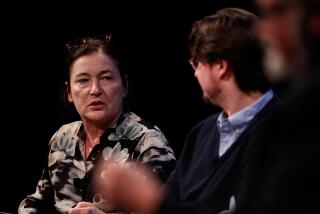Fugitive Guests
- Share via
“The gods are fugitive guests of literature,” the Italian virtuoso Roberto Calasso trumpets in the opening bars of his latest series of essays, “Literature and the Gods.” The author of “Ka” and “The Marriage of Cadmus and Harmony,” Calasso has sat at table with the deities before, and there was never any question of who was carving and who was bringing the wine. In a series of eight chapters based on the Weidenfeld Lectures he delivered at Oxford in May 2000, Calasso leads his guests through a selective tour of French and German literature, from 1798, when Friederich Schlegel, Novalis and other co-conspirators founded the magazine Athenaeum, to 1898 and the death of Stephane Mallarme.
Calasso’s subject is how the return of the pagan gods into the writing of these northern European poets guided the quest for “absolute literature,” a literature in which music precedes meaning. At the beginning of the quest, Dionysus returns to German shores in the poetry of Hlderlin. Midway, Charles Baudelaire escapes from the classical rigidity of alexandrines to write perhaps the most beautiful poem ever written, “Invitation au Voyage” from “Fleurs du Mal,” in which the very sound of the syllables paints meaning before the sense of the phrase is completed. At the end, as Mallarme laments, the death of that “powerful Cyclops” Victor Hugo releases verse “in a free disjunction of thousands of simple elements.” The twilight of the gods turns to night.
The 19th century, of course, is not the alpha and omega of Calasso’s attention. Twentieth century exemplars of the absolute and pagan include Nabokov with his nymphet and Ezra Pound. “When we read the essays of Baudelaire or Proust, of Hofmannsthal or Benn, Valery or Auden ... Borges or Nabokov, Manganelli, Calvino, Canetti, Kundera, we immediately sense-even though each may have hated, or ignored, or even opposed the other-that they are all talking about the same thing.... [T]hey know that the literature they’re talking about is not to be recognized by its observance of any theory, but rather by a certain vibration or luminescence of the sentence [or paragraph, or page, or chapter, or whole book even].”
Calasso’s own method (luminescent in its own way) is to open with a scene that initially appears familiar until the injection of a word or phrase mutates the equation. Here in one case is how he writes of a talk given by Mallarme: “On March 1st 1894, in Oxford, and before an audience of about sixty people, dotted here and there with a few professors but mainly made up, as he himself would put it, of ladies ‘looking for a chance to hear spoken French,’ Mallarme gave the lecture generally known as ‘La Musique et les Lettres.”’ Or in another, how he characterizes Gottfried Benn, the 20th century German poet and physician: “Exhausted, his work still banned, Berlin in ruins round his clinic for syphilitics, he wrote....” The “ladies,” the “syphilitics,” far from modifying the scene, become the center of the worlds of these sentences.
Sexuality, after all, is a powerful seducer of readers and key to the pagan appeal. “In short,” Calasso says elsewhere in a discussion of Baudelaire and Heinrich Heine, “the real news is this: The Olympian gods are back and in business, but they live in the demi-monde.” It’s a stimulating image-Calasso as a literary Maurice Chevalier, with Venus on one arm and Diana on the other, singing “Thank Heaven for Little Girls’-and seductive as hell.
Although his subject is Western European literature of the 19th century, Calasso’s sifter is Indian: the Vedic philosophy of the primacy of syllables. “One squeezes a juice ... from anything, says the ‘Jaiminiya Upanishad Brahmana.’ But not from the syllable: Because the syllable is itself the juice of everything.... And from the syllable all else flows.” The “om” is perhaps the most popular of Calasso’s examples, the “yes” that adds affirmation rather than meaning, which is still unborn.
Even when Calasso strays into displays of erudition that seem as parodic as any Woody Allen vignette-’K.O. Mller, who died of sunstroke in Greece after having introduced the term ‘chthonian’ into classical studies’-he is nothing less than entertaining. There’s a bit of Jack Benny to his Jascha Heifetz, a spritz of borscht in his Dionysiac flagon, that seduce a reader in search of ideas that entertain as well as edify, that make a reader want to catch Calasso live in the lecture hall-perhaps in the company of ladies looking for a chance to hear spoken Italian.
More to Read
Sign up for our Book Club newsletter
Get the latest news, events and more from the Los Angeles Times Book Club, and help us get L.A. reading and talking.
You may occasionally receive promotional content from the Los Angeles Times.










